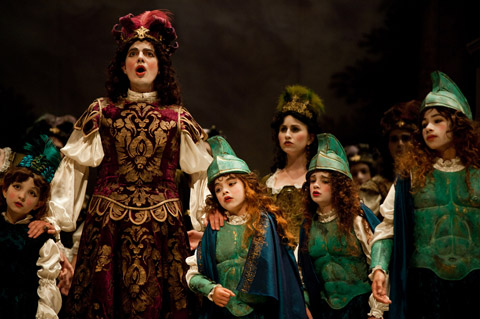 |
This is the Baroque opera production I've been waiting for. Not because of the opera itself — I'd never heard of either the composer, Agostino Steffani (1653-1728), who overlaps with Lully, Purcell, and Handel; or the opera, Niobe, Regina di Tebe (Niobe, Queen of Thebes), before the Boston Early Music Festival announced it for this season. It has some wonderful music, though it isn't consistently wonderful, and the plot is an odd, sometimes confusing, amalgamation of Ovid and 17th-century romances. But it's a production in which everything I tend to dislike in "authentic" Baroque productions here actually contributes to the overall effect. There isn't a singer who isn't up to his or her role, and everyone on stage manages to make those stiff, artificial Baroque-handbook poses and gestures more fluid and expressive than I've ever seen them. The scenery (Gilbert Blin, who's also the stage director) is both stylish and imaginative — the traditional flats, in perspective, slide smoothly and wittily in and out and up and down, giving everyone on stage interesting places to move (including flying in on a magic cloud or a dragon-pulled chariot). The costumes (Anna Watkins) are lavish but also characterful. And even the Baroque dances (choreographed by Caroline Copeland and Carlos Fittante, who also appear as dancers), for once, both have character and are in character (there's even an irresistible dancing bear!).
As always, the BEMF orchestra is superlative, and leaders Paul O'Dette and Stephen Stubbs (theorobo and guitar) really bite into the dance rhythms, keeping everything aloft .
The original story, from Ovid's Metamorphoses, concerns a queen who is prouder of her many children than the gods prefer. They kill the children and turn her into a statue, incapable of further weeping (Hamlet compares his mother, on the death of Hamlet's father, to "Niobe, all tears"). In the opera, there's also a complicated political plot, involving King Amphion's decision to turn the throne over to Niobe so he can contemplate the universe. Power goes to Niobe's head. She's not very nice to the blind seer Tiresias — always, in mythology, a mistake (ask Oedipus). After four hours, it doesn't end well for Amphion, Niobe, or their children. Not all Blin's staging clarifies the action, but that may be asking too much given this libretto. I was tickled by the young heroine, Manto, Tiresius's daughter (the charmingly naïve Yulia Van Doren) entering (rather than, as in Shakespeare, exiting) "pursued by a bear."
There are four (count 'em) countertenors, two of whom (Kevin D. Skelton and Matthew White) are excellent, and two of them even better. José Lemos (a counter-mezzo?) made a huge hit as that staple of Baroque opera, the comic nurse, who warns against the evils of men. And the celebrated 33-year-old French countertenor Philippe Jaroussky, in his North American stage debut, won the audience with his beautiful, strong, clear tone, breathtaking technical bravura, and emotional nuance as Anfione (King Amphion). The greatest music in the opera is his hymn to the harmony of the spheres — a passage of ravishingly quiet contemplation, with four viols under the Majestic stage supplying those unearthly harmonies.